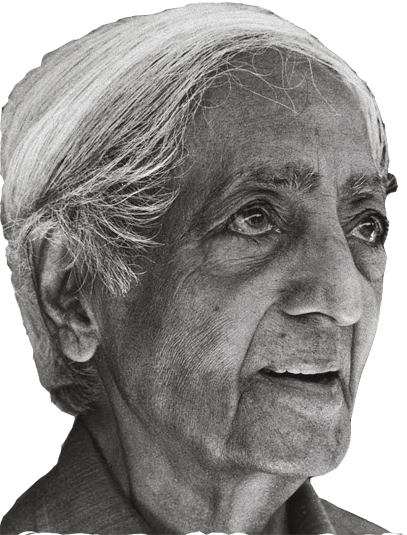
JIDDU KRISHNAMURTI
Jiddu Krishnamurti (1895-1986) whose life and teachings spanned the greater part of the 20th Century, is regarded by many as one who has had the most profound impact on human consciousness in modern times.
Sage, philosopher and thinker, he illumined the lives of millions the world over – intellectuals and laymen, young and old. Breaking away from all organized religions and denying his role as a Guru, he spelt out his mission: to set man absolutely and unconditionally free.
He travelled round the world till the age of 90 giving talks, writing, holding discussions.
He talked of the things that concern all of us in our everyday life; the problems of living in modern society, the individual’s search for security, and the need for human beings to free themselves from from their inner burdens of violence, fear and sorrow.
Educational Work
Krishnamurti regards education as of prime significance in the communication of that which is central to the transformation of the human mind and the creation of a new culture. Such a fundamental transformation takes place when the child, while being trained in various skills and disciplines, is also given the capacity to be awake to the processes of his own thinking, feeling and action. This alertness makes him self-critical and observant and thus establishes an integrity of perception, discrimination and action, crucial to the maturing within him of a right relationship to Man, to nature and to the tools Man creates.
On Fear
“Then we can ask what is the teacher teaching and what is the pupil receiving, and more widely – what is learning? What is the educator’s function? Is it to teach merely algebra and physics or is it to awaken in the student – and so in himself – this enormous sense of responsibility? Can the two go together? That is, the academic subjects which will help in a career and this responsibility for the whole of mankind and life.”
On Learning
“When the nature of freedom is understood, then you eliminate all competition; on the playing field, in the classroom. Is it possible to eliminate altogether the comparative evaluation, academically or ethically? Is it possible to help the student not to think competitively in the academic field and yet to have excellence in his studies, his actions and his daily life? Please bear in mind that we are concerned with the flowering of goodness which cannot possibly flower where there is any competition. Competition exists only when there is comparison, and comparison does not bring about excellence. These schools fundamentally exist to help both the student and the teacher to flower in goodness. ”
On Relationship
“You are in various schools and you are being educated, that is, you are learning mathematics, history, geography, science, and so on. Why? Have you ever wondered? Is it merely in order to earn a living afterwards? Is that the purpose of education? Is education merely a matter of passing examinations and putting a few letters after your name, or is it something entirely different? If you look around, you will see what an awful mess the world is in. […] There are the poor and the rich, those who are ill and those who have good health, and throughout the world there are wars, there are miseries, there is every kind of trouble. And should you not begin to think about these things while you are young?”
On Beauty and Nature
“I don’t know if any of you have noticed, early in the morning, the sunlight on the waters. How extraordinarily soft is the light, and how the dark waters dance, with the morning star over the trees, the only star in the sky. Do you ever notice any of that? Or are you so busy, so occupied with the daily routine, that you forget or have never known the rich beauty of this earth – this earth on which all of us have to live?”
